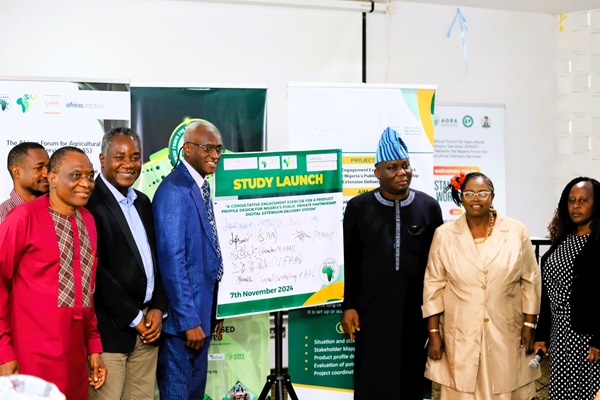
Key stakeholders in Nigeria’s public and private sectors are calling for a sustainable public-private partnership (PPP) model to drive digital agricultural extension solutions.
This call was made during a workshop organised by the Sasakawa Africa Association, marking the launch of a project titled “A Consultative Engagement Exercise for a Product Profile Design for Nigeria’s Public-Private Partnership Digital Extension Delivery System.
Funded by the Bill and Melinda Gates Foundation, the project aims to conduct an engagement exercise and scoping study in Oyo, Gombe and Kaduna states. The goal is to identify and design a digital extension delivery solution that addresses the unique needs of small-scale farmers, promotes gender equality and enhances climate resilience in crop and livestock value chains.
The African Forum for Agricultural Advisory Services (AFAAS) is leading the project in collaboration with SAA, AGRA, Sahel Consulting and Africa Practice. The launch event brought together participants from the Ministry of Agriculture, government agricultural development programmes (ADPs), agro-allied companies, financial institutions, tech firms, digital agricultural service providers, NGOs, donor-funded agricultural programmes and farmer organisations.
In his opening remarks, director of the Federal Department of Agricultural Extension, Dr. Adeola Lordbanjou emphasised the need for innovative approaches, citing the limitations of traditional training and visit (T&V) methods.
“Nigeria currently has far too few extension agents,” he noted. “Where we once had one extension agent per 500 farmers, now we have one for every 10,000 households. The T&V approach has become ineffective and inefficient, contributing significantly to low productivity in our agricultural sector. To address this, we launched the National Agricultural Extension Policy (NAEP) last year, which emphasises ICT integration. This opens the door for digital technologies to serve the farmers who feed us and fuel our economy. Today’s project launch marks a bold step in the right direction.”
“Government recognises the role of the private sector; thus, collaboration within a PPP model is essential to modernising and revitalising our agricultural extension system,” Lordbanjou added.
Executive director of AFAAS, Dr. Silim Nahdy highlighted that the project reflects the Gates Foundation’s commitment to expanding access to quality digital solutions for small-scale producers. He emphasised the importance of integrating and bundling digital solutions for more significant impact at the farmer level.
“This project will identify a viable solution that can be delivered through a sustainable PPP model,” Nahdy explained. “It will consider how small-scale producers access services and promote operational collaboration among private, public and nonprofit sectors in delivering extension services. It will also assess the private sector’s willingness to co-fund the long-term maintenance of the platform or expand existing solutions.”
As participants assessed the needs, gaps and SWOT analysis of PPPs for digital advisory and extension services, country director of SAA Nigeria, Dr. Godwin Atser urged stakeholders to collaborate, not work in silos, to drive Nigeria’s agricultural transformation through digital solutions.
“Sasakawa is laying the foundation for this study,” Atser said. “We are working with experts to conduct conceptual, gap, and gender assessments. This will help synthesise the needs of small-scale producers and identify what incentivises the private sector to invest in digital extension.”


